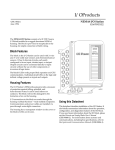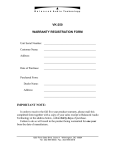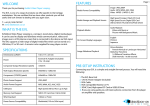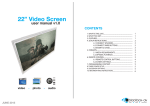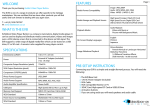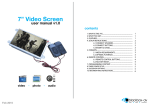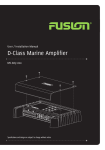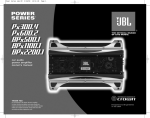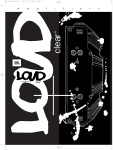Download Fusion PP-AM100010 Stereo Amplifier User Manual
Transcript
POWERPLANT AMPLIFIER MANUAL PP-AM300010 PP-AM200010 PP-AM120040 PP-AM60020 PP-AM100010 CONTENTS • AMPLIFIER SPECIFICATIONS . . . . . . . . . . . . . . . . . . . . . . . . . . . . . . .pg 4 • AMPLIFIER INSTALLATION . . . . . . . . . . . . . . . . . . . . . . . . . . . . . . . . .pg 5 • FOUR CHANNEL AMPLIFIER . . . . . . . . . . . . . . . . . . . . . . . . . . . . . . .pg 6 • TWO CHANNEL AMPLIFIER . . . . . . . . . . . . . . . . . . . . . . . . . . . . . . . .pg 8 • MONOBLOCK AMPLIFIERS . . . . . . . . . . . . . . . . . . . . . . . . . . . . . . . . .pg 10 • TROUBLESHOOTING . . . . . . . . . . . . . . . . . . . . . . . . . . . . . . . . . . . . . .pg 12 RECORD YOUR PRODUCT DETAILS HERE: MODEL NUMBER DATE OF PURCHASE AFFIX RECEIPT HERE Version 1.0 2 3 ACCEPTABLE AMPLIFIER LOADS AMPLIFIER SPECIFICATIONS 4 Ohm 2 Ohm 1 Ohm PP-AM120040 YES* YES* NO PP-AM60020 YES* YES * NO PP-AM300010 YES YES YES 1 2 PP-AM300010 (Monoblock) PP-AM200010 (Monoblock) Class D-Class D-Class Max Power Rating 3000 Watts 2000 Watts Frequency Response 20Hz - 320kHz 20Hz - 320kHz PP-AM200010 YES YES YES Dimensions (mm) 436(L) x 278(W) x 60(H) 436(L) x 278(W) x 60(H) PP-AM100010 YES YES NO Power Ratings 850 Watts RMS per Channel @ 4 Ohms 1% THD+N 1300 Watts RMS per Channel @ 2 Ohms 1% THD+N 1500 Watts RMS x 1 Channel @ 1 Ohms 1% THD+N 600 Watts RMS x 1 Channel @ 4 Ohms 1% THD+N 900 Watts RMS x 1 Channel @ 2 Ohms 1% THD+N 1000 Watts RMS x 1 Channel @ 1 Ohms 1% THD+N PP-AM100010 (Monoblock) PP-AM120040 (4 Channel) Class D-Class Class AB Max Power Rating 1000 Watts 1200 Watts Frequency Response 20Hz - 320kHz 10Hz - 100kHz Dimensions (mm) 386(L) x 278(W) x 60(H) 546(L) x 278(W) x 60(H) Power Ratings 400 Watts RMS x 1 Channel @ 4 Ohms 1% THD+N 620 Watts RMS x 1 Channel @ 2 Ohms 1% THD+N 125 Watts RMS per Channel @ 4 Ohms 1% THD+N 165 Watts RMS per Channel @ 2 Ohms 1% THD+N 330 Watts RMS Bridged Channels @ 4 Ohms 1% THD+N PP-AM60020 (2 Channel) 4 Model Class Class AB Max Power Rating 600 Watts Frequency Response 10Hz - 100kHz Dimensions (mm) 436(L) x 278(W) x 60(H) Power Ratings 125 Watts RMS per Channel @ 4 Ohms 1% THD+N 190 Watts RMS per Channel @ 2 Ohms 1% THD+N 390 Watts RMS Bridged Channels @ 4 Ohms 1% THD+N 1 2 * Per Channel and Bridged Channel(s), * Per Channel ONLY 1 2 NB : PP-AM100010 IS NOT 1 Ohm STABLE AMPLIFIER INSTALLATION INSTALLATION WARNING 1. Ensure the 12V lead is disconnected from the battery before you connect any new equipment. 2. Ensure the mounting location will not interfere with the gas tank, brake lines or electrical wiring. 3. Ensure the Amplifier is securely fastened to the vehicle to prevent damage in the event of an accident. 4. Ensure all wiring is protected to avoid pinching or crushing which could result in damage to the audio system. 5. Ensure the mounting location has sufficient air flow around the amplifier. If the amplifier is mounted in an enclosed space a 3” fan with ducting should be used to aid in air flow. 6. Do not mount any amplifier on a subwoofer enclosure as extended exposure to vibration may cause malfunction of the amplifier. 7. Ensure you use the recommended gauge wire/cable for all amplifier connections. Wiring Ensure the audio system is turned off before making any connections to the amplifier, speakers or source unit. Failure to do so could result in permanent damage to the audio system. When wiring the FUSION amplifier ensure that the cable is protected from sharp objects and always use rubber grommets when wiring through metal panels. Ensure all terminals and connections are protected from the vehicle chassis and from each other as failure to do so could result in permanent damage to the audio system. 5 6. Front Input Level This control is used to match the input level of the amplifier to the output level of your source unit 1. Turn the amplifier level to zero. 2. Turn the volume of the source unit to ¾ and the bass and treble to zero. 3. Adjust the level control until the desired maximum volume is achieved without distortion. 4. Failure to follow these steps may cause permanent damage to the audio system. FOUR CHANNEL AMPLIFIER PP-AM120040 1 2 3 16 7. Frequency Control – Front X-Over 12dB/Octave crossover, variable from 32Hz to 320Hz. (For adjustment procedure see 16.) a. 8 10 13 b. c. 4 5 9 11 12 6 7 14 15 1. Speaker Output Connections Ensure that the speakers are connected observing correct polarity. 2 Ohm minimum speaker impedance for stereo operation 4 Ohm minimum speaker impedance for bridged operation 2. Fuses Ensure fuses are replaced with the same type and rating. 3. Power FUSION amplifiers should be connected directly to the 12V battery terminal with an inline fuse or circuit breaker as close to the battery as possible. Ground When grounding/earthing your amplifier ensure that the location is a good source of ground (preferably the floor pan). Make sure the metal is clean of paint etc, as a poor earth could damage your audio system. Remote Turn On This connection turns the amplifier ON and should be connected to the remote turn on lead from the Head Unit. If one is not available a switched 12V source must be used. 4. Output Connectors Line level output for connection to an additional amplifier 5. Front Input Connectors Choose the correct length RCA interconnects and run them to the RCA outputs of the source unit. Avoid running beside other looms and or power cable. 6 8. Filter Selector – Front X-Over LPF – Select for subwoofer(s). Flat – Select for full range speakers. HPF – Select for mid/full range speakers when using a subwoofer in the system. 9. Bass Boost Control Adjust the Bass Boost to the desired level. 10. Filter Selector – Rear X-Over LPF - Select for subwoofer(s). Flat – Select for full range speakers. HPF – Select for mid/full range speakers when using a subwoofer in the system. 11. Frequency Controller – Rear X-Over 12dB/Octave crossover, variable from 32Hz to 320Hz. For adjustment procedure see 16. 12. Rear Input Level This control is used to match the input level of the amplifier to the output level of your head unit 1. Turn the amplifier level to zero. 2. Turn the volume of the head unit to ¾ and the bass and treble to zero. 3. Adjust the level control until the desired maximum volume is achieved without distortion. 4. Failure to follow these steps may cause permanent damage to the audio system. 13. Power ON LED Amplifier is operational when illuminated. 14. Protection LED When illuminated the amplifier is in protection mode due to any of the following fault conditions. Short Circuit, Thermal, Output Short, DC Offset. 15. Rear Input Connectors Choose the correct length RCA interconnects and run them to the RCA outputs of the source unit. Avoid running beside other looms and or power cable. 16. Setting the Crossover a. Diagram for crossover settings for 5” or larger full range speakers. b. Diagram for crossover settings for mid/full range speakers when using a subwoofer in your system. c. Diagram for crossover settings for subwoofers. NB: The gray section indicates acceptable frequency ranges. 7 5. Input Connectors Choose the correct length RCA interconnects and run them to the RCA outputs of the source unit. Avoid running beside other looms and or power cable. TWO CHANNEL AMPLIFIER PP-AM60020 1 2 6. Input Level This control is used to match the input level of the amplifier to the output level of your head unit 1. Turn the amplifier level to zero. 2. Turn the volume of the head unit to ¾ and the bass and treble to zero. 3. Adjust the level control until the desired maximum volume is achieved without distortion. 4. Failure to follow these steps may cause permanent damage to the audio system. 3 12 a. 10 b. 7. Frequency Control 12dB/Octave crossover, variable from 32Hz to 320Hz. (For adjustment procedure see 12.) 8. Filter Selector - Crossover LPF - Select for subwoofer(s). Flat – Select for full range speakers. HPF – Select for mid/full range speakers when using a subwoofer in the system. 9. Boost Control Adjust the Bass Boost to the desired level. c. 4 5 8 6 9 11 7 1. Speaker Output Connections Ensure that the speakers are connected observing correct polarity. 2. Fuses Ensure fuses are replaced with the same type and rating. 3. Power FUSION amplifiers should be connected directly to the 12V battery terminal with an inline fuse or circuit breaker as close to the battery as possible. Ground When grounding/earthing your amplifier ensure that the location is a good source of ground (preferably the floor pan). Make sure the metal is clean of paint etc, as a poor earth could damage your audio system. Remote Turn On This connection turns the amplifier on and should be connected to the remote turn on lead from the Head Unit. If one is not available a switched 12V source must be used. 10. Power ON LED Amplifier is operational when illuminated. 11. Protection LED When illuminated the amplifier is in protection mode due to any of the following fault conditions. Short Circuit, Thermal, Output Short, DC Offset. 12. Setting the Crossover a. Diagram for crossover settings for 5” or larger full range speakers. b. Diagram for crossover settings for mid/full range speakers when using a subwoofer in your system. c. Diagram for crossover settings for subwoofers. NB: The gray section indicates acceptable frequency ranges. 4. Output Connectors Line level output for connection to an additional amplifier. 8 9 4. Output Connectors Line level output for connection to an additional amplifier MONOBLOCK AMPLIFIERS PP-AM100010, PP-AM200010, PP-AM300010 1 2 5 6 7 Input Connectors Choose the correct length RCA interconnects and run them to the RCA outputs of the source unit. Avoid running beside other looms and or power cable. 6. Input Level This control is used to match the input level of the amplifier to the output level of your head unit 1. Turn the amplifier level to zero. 2. Turn the volume of the head unit to ¾ and the bass and treble to zero. 3. Adjust the level control until the desired maximum volume is achieved without distortion. 4. Failure to follow these steps may cause permanent damage to the audio system. 7. Frequency Control 12dB/Octave Low Pass crossover, variable from 32Hz to 320Hz. 8. Subsonic Filter This is a variable control that filters out all sub bass frequencies below the set point at 12dB/ Octave. 9. Boost Control ( Rear ) Adjust the Bass Boost to the desired level 3 11 4 5. 8 9 10 12 10. Remote Level Control Connect the Remote Level Controller using the supplied cable. 11. Power ON LED Amplifier is operational when illuminated. 1. Speaker Output Connections Ensure that the speakers are connected observing correct polarity. 2. Fuses Ensure fuses are replaced with the same type and rating (PP-AM100010 Pictured Above). PP-AM100010 25A x 3 PP-AM200010 40A x 3 PP-AM300010 40A x 4 12. Protection LED When illuminated the amplifier is in protection mode due to any of the following fault conditions. Short Circuit, Thermal, Output Short, DC Offset. 3. Power FUSION amplifiers should be connected directly to the 12V battery terminal with an inline fuse or circuit breaker as close to the battery as possible. Ground When grounding/earthing your amplifier ensure that the location is a good source of ground (preferably the floor pan). Make sure the metal is clean of paint etc, as a poor earth could damage your audio system. Remote Turn On This connection turns the amplifier on and should be connected to the remote turn on lead from the Head Unit. If one is not available a switched 12V source must be used. 10 11 NOTES TROUBLESHOOTING PROBLEM Amplifier not switching on. Power LED not ‘ON’ Amplifier not working, but status LED ‘ON’ No sound 12 POSSIBLE REASON SOLUTION • No +12V to power wire • Check fuses and connections to battery • No power to remote wire • Check Remote Turn ON connection(s) to head unit • Fuse broken • Replace fuse with correct type and amperage • Fuse on amplifier blown • Replace fuse with correct type and amperage • Amplifier too hot • Move amplifier to vented area • Turn head unit down • Speaker wires shorted • Check that there are no speaker wires shorted to another wire or to the vehicle chassis • RCA Signal • Check RCA connection to head unit • Gain control not set up • Ensure you have set up the amplifier gain level control • Head Unit • Check head unit volume level • Amplifier • Check all power, remote on and groundconnections • Speakers • Check speakers for wire shorts 13 NOTES PUBLISHED BY FUSION ELECTRONICS LIMITED: © Copyright 2008 by FUSION Electronics Limited. All rights reserved. Specifications and design are subject to change without notice. 14 YOU CAN HELP PROTECT THE ENVIRONMENT! Please remember to respect the local regulations: Hand in the non-working electrical equipment to an appropriate waste disposal center. 15 Specifications and design are subject to change without notice









